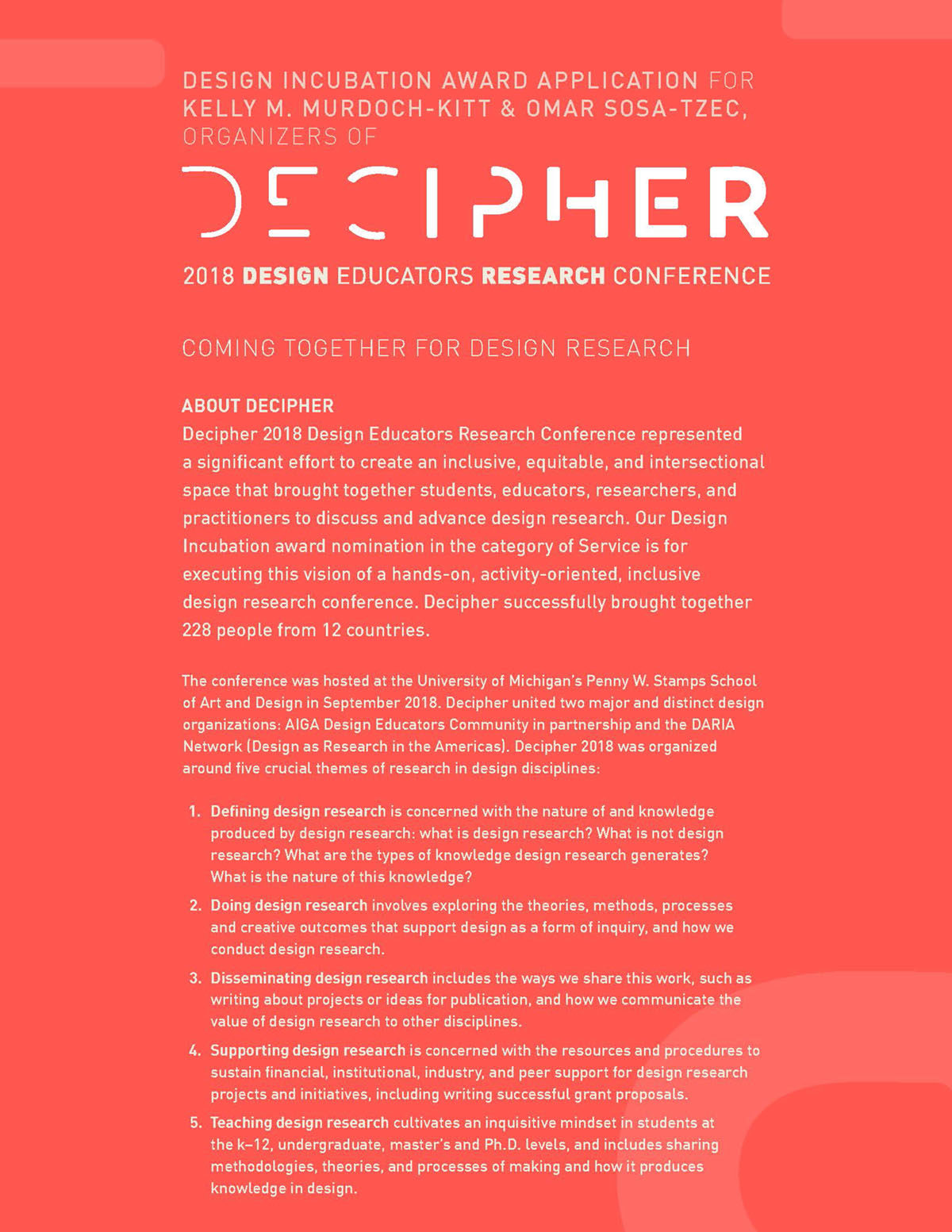Kelly Murdoch-Kitt, Assistant Professor, University of Michigan
Omar Sosa-Tzec, Assistant Professor, University of Michigan
Decipher 2018 Design Educators Research Conference represented a significant effort to create an inclusive, equitable, and intersectional space that brought together students, educators, researchers, and practitioners to discuss and advance design research. Our nomination in the category of Service is for executing this vision of a hands-on, activity-oriented, inclusive design research conference. Decipher successfully brought together 228 people from 12 countries.
The conference was hosted at the University of Michigan’s Penny W. Stamps School of Art and Design in September 2018. Decipher united two major and distinct design organizations: AIGA Design Educators Community in partnership and the DARIA Network (Design as Research in the Americas). Decipher 2018 was organized around five crucial themes of defining, doing, disseminating, supporting and teaching research in design disciplines.
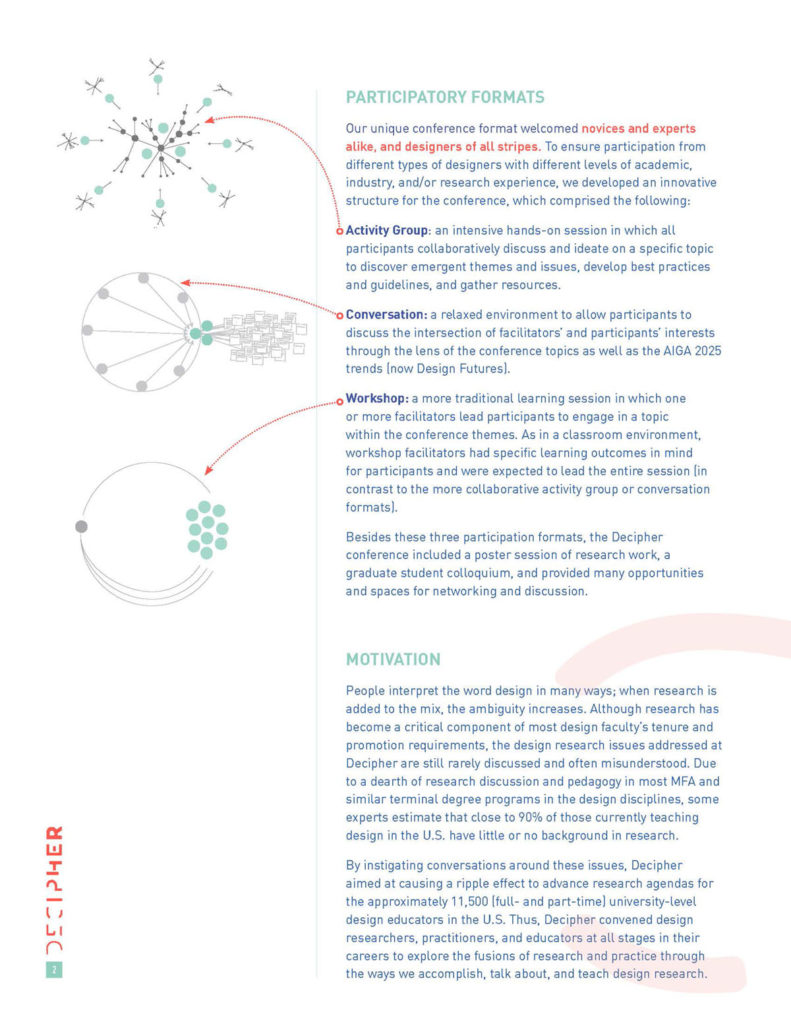
To ensure participation from different types of designers with different levels of academic, industry, and/or research experience, we developed an innovative structure for the conference, which comprised the following modalities:
Activity Group: an intensive hands-on session in which all participants collaboratively discuss and ideate on a specific topic to discover emergent themes and issues, develop best practices and guidelines, and gather resources.
Conversation: a relaxed environment to allow participants to discuss the intersection of facilitators’ and participants’ interests through the lens of the conference topics as well as the AIGA 2025 trends (now Design Futures).
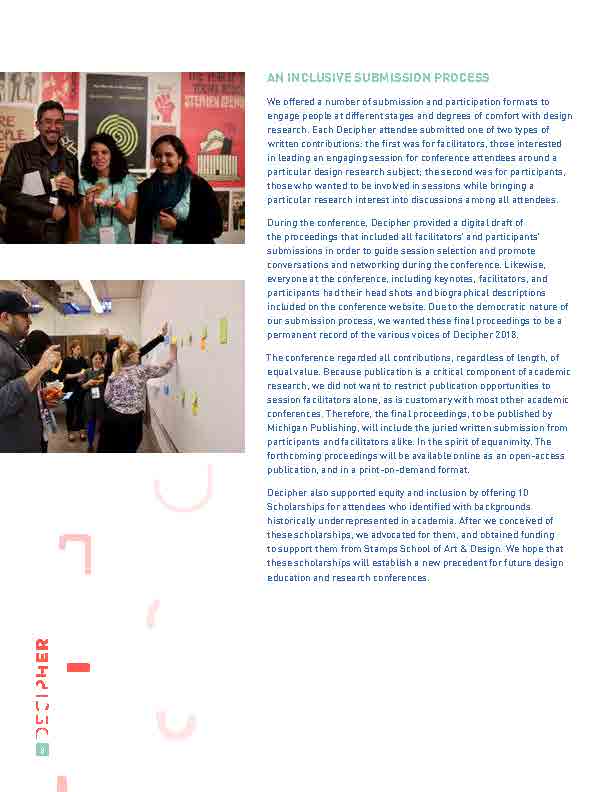
Workshop: a more traditional learning session in which one or more facilitators lead participants to engage in a topic within the conference themes. As in a classroom environment, workshop facilitators had specific learning outcomes in mind for participants and were expected to lead the entire session (in contrast to the more collaborative activity group or conversation formats).
Besides these three participation modalities, the Decipher conference included a poster session of research work, a graduate student colloquium, and provided several spaces for networking and discussion.
*Motivation*
People interpret the word design in many ways; when research is added to the mix, the ambiguity increases. Although research has become a critical component of most design faculty’s tenure and promotion requirements, the design research issues addressed at Decipher are still rarely discussed and often misunderstood. Due to a dearth of research discussion and pedagogy in most MFA and similar terminal degree programs in the design disciplines, some experts estimate that close to 90% of those currently teaching design in the U.S. have little or no background in research.
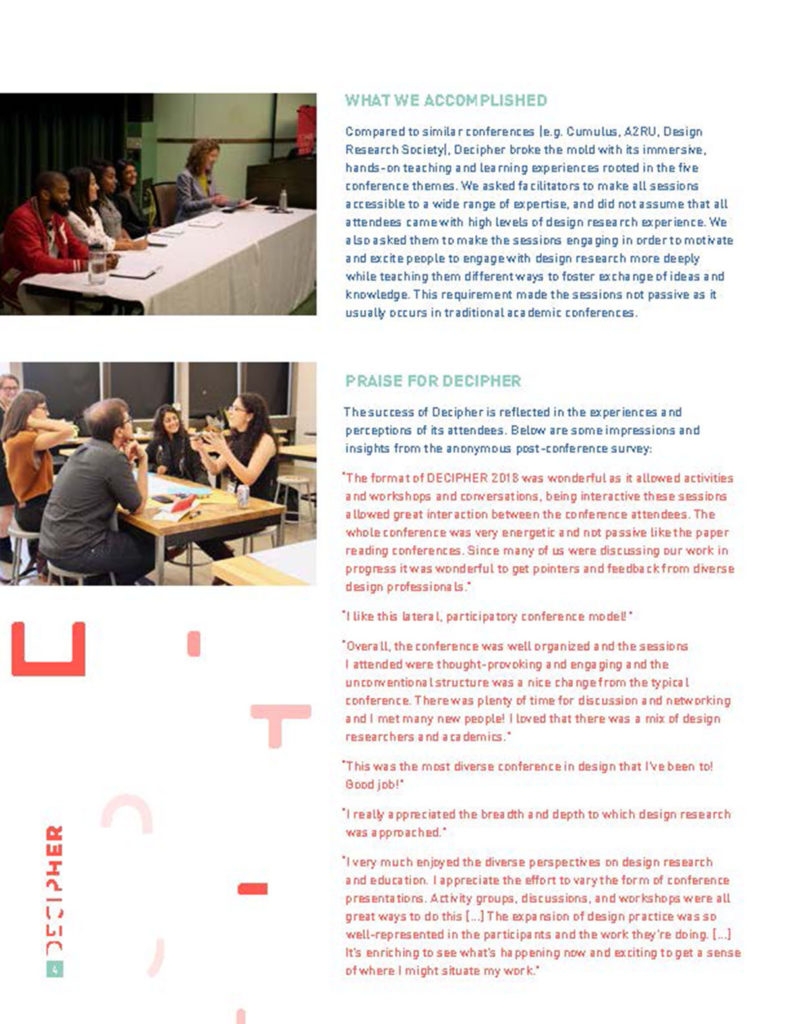
By instigating conversations around these issues, Decipher aimed at causing a ripple effect to advance research agendas for the approximately 11,500 (full- and part-time) university-level design educators in the U.S. Thus, Decipher convened design researchers, practitioners, and educators at all stages in their careers to explore the fusions of research and practice through the ways we accomplish, talk about, and teach design research.
*An Inclusive Submission Process*
We offered a number of submission and participation formats to engage people at different stages and degrees of comfort with design research. Each Decipher attendee submitted one of two types of written contributions: the first was for facilitators, those interested in leading an engaging session for conference attendees around a particular design research subject; the second was for participants, those who wanted to be involved in sessions while bringing a particular research interest into discussions among all attendees.
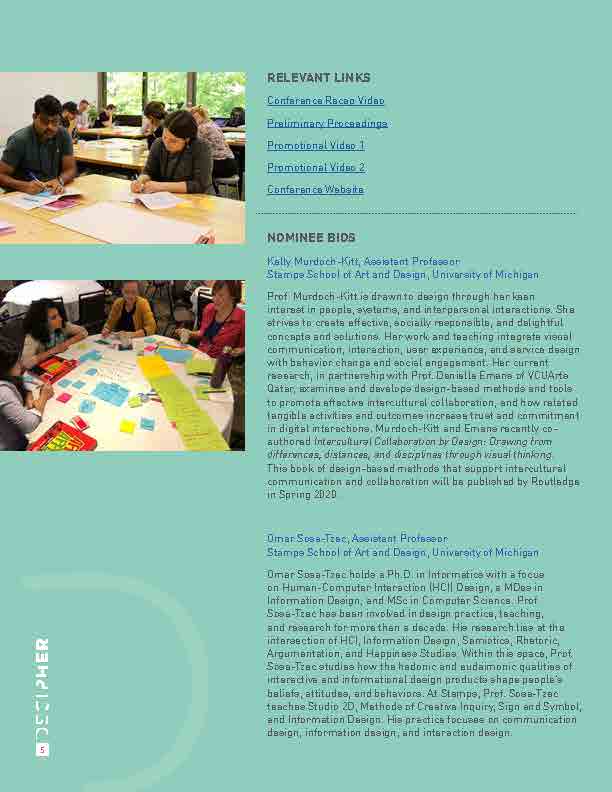
During the conference, Decipher provided a digital draft of the proceedings that included all facilitators’ and participants’ submissions in order to guide session selection and promote conversations and networking during the conference. Likewise, everyone at the conference, including keynotes, facilitators, and participants had their headshots and biographical descriptions included on the conference website. Due to the democratic nature of our submission process, we wanted these final proceedings to be a permanent record of the various voices of Decipher 2018.
The conference regarded all contributions, regardless of length, of equal value. Because publication is a critical component of academic research, we did not want to restrict publication opportunities to session facilitators alone, as is customary with most other academic conferences. Therefore, the final proceedings, to be published by Michigan Publishing, will include the juried written submission from participants and facilitators alike. In the spirit of equanimity. The forthcoming proceedings will be available online as an open-access publication, and in a print-on-demand format.
Decipher also supported equity and inclusion by offering 10 Scholarships for attendees who identified with backgrounds historically underrepresented in academia. After we conceived of these scholarships, we advocated for them, and obtained funding to support them from Stamps School of Art & Design. We hope that these scholarships will establish a new precedent for future design education and research conferences.
*What we accomplished*
Compared to similar conferences (e.g. Cumulus, A2RU, Design Research Society), Decipher broke the mold with its immersive, hands-on teaching and learning experiences rooted in the five conference themes. We asked facilitators to make all sessions accessible to a wide range of expertise, and did not assume that all attendees came with high levels of design research experience. We also asked them to make the sessions engaging in order to motivate and excite people to engage with design research more deeply while teaching them different ways to foster exchange of ideas and knowledge. This requirement made the sessions not passive as it usually occurs in traditional academic conferences.
Our PDF expands on this overview and includes images and links to additional supporting resources, such as an outcomes video documenting the attendee experience.
Kelly Murdoch-Kitt, Assistant Professor, Stamps School of Art and Design, University of Michigan
Prof. Murdoch-Kitt is drawn to design through her keen interest in people, systems, and interpersonal interactions. She strives to create effective, socially responsible, and delightful concepts and solutions. Her work and teaching integrate visual communication, interaction, user experience, and service design with behavior change and social engagement. Her current research, in partnership with Prof. Denielle Emans of VCU School of the Arts Qatar, examines and develops design-based methods and tools to promote effective intercultural collaboration, and how related tangible activities and outcomes increase trust and commitment in digital interactions. Murdoch-Kitt and Emans recently coauthored Intercultural Collaboration by Design: Drawing from differences, distances, and disciplines through visual thinking. This book of design-based methods that support intercultural communication and collaboration will be published by Routledge in Spring 2020.
Omar Sosa-Tzec, Assistant Professor, Stamps School of Art and Design, University of Michigan
Omar Sosa-Tzec holds a Ph.D. in Informatics with a focus on Human-Computer Interaction (HCI) Design, a MDes in Information Design, and MSc in Computer Science. Prof. Sosa-Tzec has been involved in design practice, teaching, and research for more than a decade. His research lies at the intersection of HCI, Information Design, Semiotics, Rhetoric, Argumentation, and Happiness Studies. Within this space, Prof. Sosa-Tzec studies how the hedonic and eudaimonic qualities of interactive and informational design products shape people’s beliefs, attitudes, and behaviors. At Stamps, Prof. Sosa-Tzec teaches Studio 2D, Methods of Creative Inquiry, Sign and Symbol, and Information Design. His practice focuses on communication design, information design, and interaction design.
Recipient of recognition in the Design Incubation Communication Design Awards 2019.
